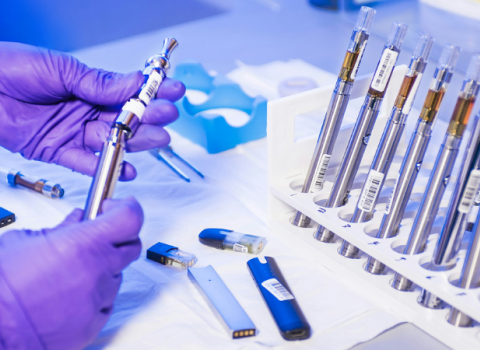
Picture courtesy www.bio.org
As the number of states and their level of activity have continued to grow, it has raised the stakes, and the incentives, in the battle to boost individual state biosciences industries. Nowadays, it's not unusual to mention Iowa, Pennsylvania, Missouri, Kansas, Texas and Florida as states strongly promoting biotechnology.
Top 12 US biotech metropolitan Areas
1. San Diego
2. Boston
3. Raleigh-Durham-Chapel Hill (North Carolina)
4. San Jose
5. Seattle-Bellevue-Everett
6. Washington, D.C.
7. Philadelphia
8. San Francisco
9. Oakland
10. Los Angeles-Long Beach
11. Orange County (California)
12. Austin-San Marcos (Texas)
Source: Milken Institute, Los Angeles, Calif.
"Many of the states are targeting specific niches based on their research and industry strengths," said Patrick Kelly, vice president of state government relations for the Biotechnology Industry Organization (BIO) a group of 1,100 companies, academic institutions and other members from more than 30 countries. "Foreign companies looking for investment or to invest with other companies may benefit. If they set up a facility in the United States, they probably will be very favourably considered for access to state funds."
Those looking to take advantage of the states' incentives must first do their homework, because all states are different. Each state has different incentives and different levels of infrastructure, such as a major university or large biotech or pharmaceutical company, to bolster biotech clusters.
There are hotbeds of expertise, such as biofuels in Midwest states such as Iowa, Indiana and other Midwest states that also are large producers of the grains used in biofuels. Only a few states, like California, New Jersey, Connecticut and Massachusetts, provide safe havens for those who want to conduct stem cell research, while others are still fighting the research.
High-profile cases
The heated competition for investment is not unlike that in Europe: states are vying, perhaps too aggressively, to lure or keep businesses, and that has resulted in two high-profile court cases, one in Ohio and one in North Carolina, that could have implications for the use of incentives to attract inward investment across the board.
In the first case the US Supreme Court is considering whether Ohio should have offered DaimlerChrysler land, tax breaks and other incentives totaling about $280 million to locate its Jeep factory in the state rather than in neighboring Michigan. DaimlerChrysler is asking the high court to overturn a 2004 ruling by the Sixth U.S. Circuit Court of Appeals against Ohio's tax credit. The plaintiffs in the case claimed that the tax credit hinders interstate commerce because the incentives are only available to businesses that invest in Ohio.
Among those filing briefs in support of DaimlerChrysler are 34 states, including Michigan. This comments: "Tax incentives are crucial to the States' ability to compete in the global marketplace and to attract investment to economically depressed areas." A ruling is expected this summer.
Separately, the North Carolina state court this spring will hear a case challenging the $242 million in tax breaks given to computer maker Dell Inc. to locate a factory there.
The outcomes of those lawsuits must be watched carefully, as they may have rippling effects on other states, and they could impact future investment, Kelly said.
It's also important for would-be investors to keep the "why" behind the states' funding in mind when considering an American partner or investor: the states are competing fiercely for expertise to grow their life sciences industries. And that competition could benefit those they are wooing.
"US states are similar to the European Union. We have a variety of little countries in close proximity that share common borders and that are competing vehemently for this industry," Kelly said.
"You can't compare one state to another. They vary in terms of their focus. They are trying to be very strategic in their investments," added Marianne Clarke, director of the Washington, DC, office of Battelle Technical Partnership Practice, which produced the first comprehensive report on state activities, "Laboratories of Innovation: State Bioscience Initiatives 2004."
The report was prepared for BIO by Battelle and the State Science and Technology Institute (SSTI) in Ohio. A new report on the states is due out on April 10 on the first day of the BIO annual conference in Chicago, Illinois. The report still was being completed as this issue of Science Business went to press, but Clarke said it will show that, "More and more states are becoming players, and the level of activity keeps increasing."
Choosing where to concentrate
Clarke said the states are looking at their own expertise in terms of what they are trying to develop. The lesser-developed states may focus on improving their R&D capacity, while more mature ones focus on commercialisation, including funding early-stage concept work and getting technology in the lab to the marketplace, she said.
Maryland, for example, in 2005 approved a tax credit to lure investment and angel funds. Angel or private investors putting $50,000 into a small biotech company with fewer than 50 employees get a 50 per cent tax credit, as do venture capitalists or institutions investing $250,000 in small biotechnology companies.
Meanwhile, Connecticut has created the $5-million BioSeed Fund, which invests up to $500,000 in early-stage companies.
Kelly said biosciences are expected to grow at a faster rate than any other US industry sector in the next decade, and that growth will support the states' activities to boost their own industries.
Biotech and biopharmaceutical firms raised more than $120 billion in financing over the past six years, most of which is used for R&D, according to BIO. In 2005, biotech companies raised $20.1 billion in public and private financing, down slightly from the $20.8 billion in 2004, but still high compared with the previous decade.
There also are several state and federal financial activities that are boosting the industry. Kelly said some states have recovered from the recession and now have surplus funds that can be tapped for biotech activities, such as the $200 million Rainy Day Fund in Texas. States also are using monies from their legal settlements with tobacco companies in November 1998. Pennsylvania, for example, used $33.8 million in tobacco settlement money to establish BioAdvance, a seed fund for southern Pennsylvania biotech companies.
Biofuel helps to kick the oil habit
Add to that the interest generated by President Bush's State of the Union address in January. The president said that "America is addicted to oil”, which had the effect of blessing alternative fuel development. In early March, Indiana Governor Mitch Daniels said the state would provide $6-7 million in tax credits and other incentives to France's Louis Dreyfus Corp. to build the world's largest biodiesel plant in Indiana.
Spain's Abengoa Bioenergy R&D already has a large research centre in another grain-rich US Midwest state, Missouri. It was granted a three-year award from the US Department of Energy in 2005 to work with several national labs and Washington University in St. Louis, Missouri, to develop new catalysts for the conversion of bio-based synthesis gas to ethanol, an alternative fuel. Abengoa also has an ethanol plant in Nebraska. Iowa and Indiana are among those states that also have major biofuels initiatives.
Other states also have biofuels investment incentives. In mid-February, Pennsylvania Governor Edward Rendell announced the investment of $3.7 million in Alternative Fuel Incentive Grants to encourage new innovative energy technologies. The grants will go to projects ranging from early-stage research to commercial implementation of the technologies.
In Michigan, Governor Jennifer Granholm said she would use the state's 21st Century Jobs Fund, which includes up to $200 million to fund cutting-edge R&D in four areas including alternative energy, to make Michigan a leader in developing alternative energy and to bring in businesses with that expertise.
Another Bush, Florida's Governor Jeb Bush, leveraged the federal government's 2003 economic stimulus package into an unusually large investment in one organisation, Scripps Research Institute, which already has a major facility in California. Governor Bush in November 2003 signed a law providing a one-time investment of $310 million out of the $500 million the state got from the federal government for Scripps to start up in Florida. "That's a huge amount of money for one institution," said BIO's Kelly.
Add to that another $200 million from Palm Beach County, where the facility is located. This year's state budget earmarks another $250 million to create the Florida Innovation Incentive Fund. Other new biotech-friendly state provisions include $75 million for early-stage private investment and $50 million in cash incentives to attract high-tech and science companies to move to Florida. Those provisions require approval by the state's legislature, which began meeting earlier this month.
Kelly said European countries and companies may be able to learn from the incentives being offered by US states. "European Union boundaries are coming down, at least on paper. Maybe they can learn a lesson of what to do or not do from the United States."





 A unique international forum for public research organisations and companies to connect their external engagement with strategic interests around their R&D system.
A unique international forum for public research organisations and companies to connect their external engagement with strategic interests around their R&D system.